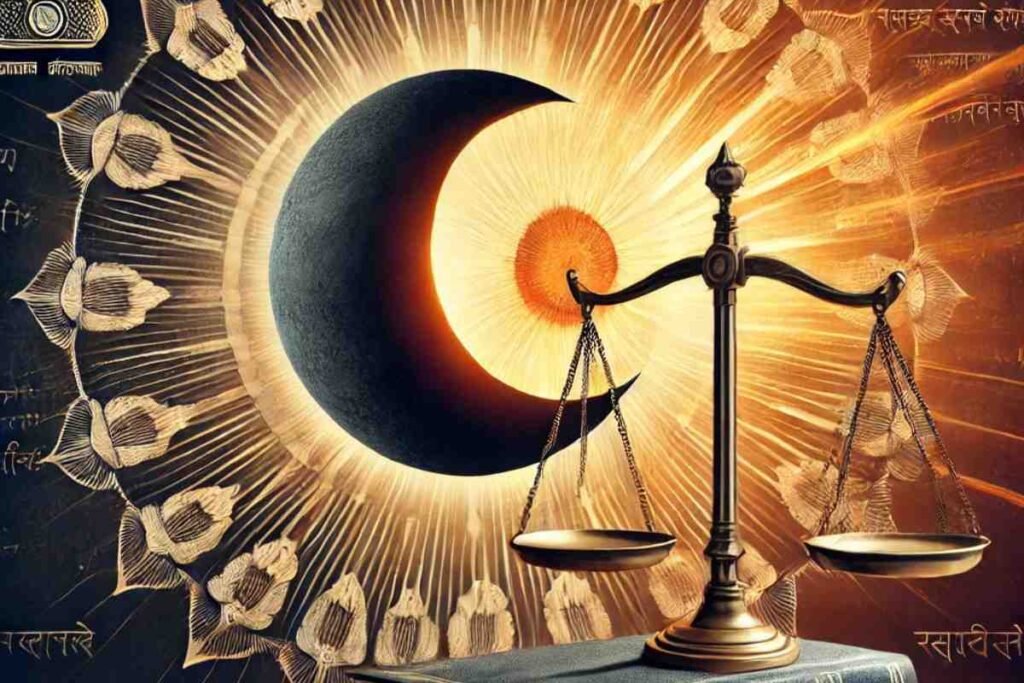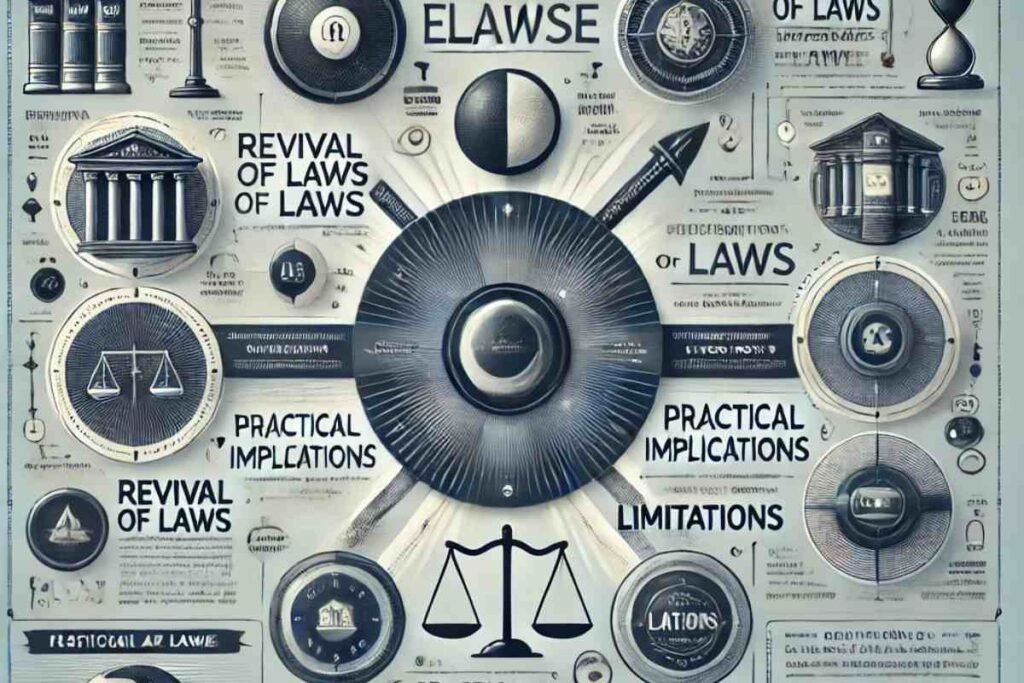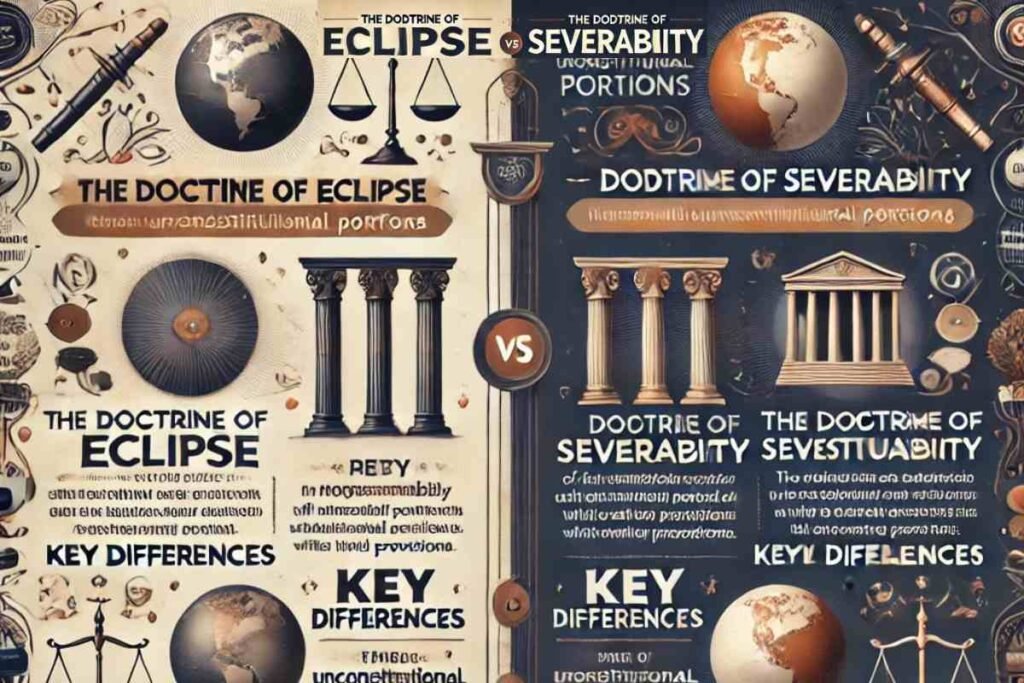The Doctrine of Eclipse is a significant principle in constitutional law, especially within the Indian legal framework. It represents how laws, partially void due to inconsistency with fundamental rights, can regain validity under certain conditions.
This doctrine, rooted in justice and equity, plays a crucial role in understanding the dynamic interplay between constitutional provisions and legislative enactments.
What Is the Doctrine of Eclipse?

The Doctrine of Eclipse is a legal principle applied in constitutional law, primarily in India. It holds that any law inconsistent with fundamental rights is not entirely null but rather remains dormant.
Such laws “eclipse” and can be revived if the inconsistency is later removed through constitutional amendments or judicial interpretations.
Origin and Evolution of the Doctrine of Eclipse
The Doctrine of Eclipse has a rich history rooted in both common law traditions and the Indian legal framework. Its evolution underscores the judiciary’s role in balancing legislative authority with constitutional supremacy.
Historical Context
The concept of the Doctrine of Eclipse finds its origins in common law jurisdictions. It gained prominence in India through judicial interpretations during the post-independence era.
The doctrine ensures a balance between legislative authority and constitutional supremacy.
Landmark Case: Bhikaji Narain Dhakras v. State of Madhya Pradesh (1955)
This case established the foundation of the doctrine in Indian constitutional law. The Supreme Court ruled that pre-constitutional laws inconsistent with fundamental rights do not become void but remain inoperative for citizens.
Key Features of the Doctrine
- Applicability: Primarily applies to pre-constitutional laws.
- Scope: Relevant for cases involving inconsistency with fundamental rights.
- Revival: Laws can regain effect if the constitutional obstacle is removed.
Constitutional Provisions Linked to the Doctrine of Eclipse
Understanding the Constitutional Provisions Linked to the Doctrine of Eclipse provides deeper insights into how this doctrine operates within the Indian legal framework.
It highlights the balance between constitutional supremacy and legislative authority.
Article 13 of the Indian Constitution
Article 13 plays a pivotal role in the application of the Doctrine of Eclipse. It states that any law inconsistent with fundamental rights is void to the extent of the inconsistency.
Relationship with Judicial Review
The doctrine complements judicial review by allowing courts to examine the validity of laws without entirely nullifying them. This ensures flexibility in governance and legislative functioning.
Applications of the Doctrine of Eclipse

The Doctrine of Eclipse plays a crucial role in ensuring that laws, once inconsistent with fundamental rights, can regain their validity after such inconsistencies are resolved.
This principle allows for the revival of laws when constitutional amendments or changes in interpretation bring them in line with fundamental rights.
In practical terms, the doctrine helps preserve legislative intent, ensuring that laws are not completely voided, but instead have the potential for relevance again when necessary.
However, its application is limited, as it does not apply to post-constitutional laws or laws that violate the “Basic Structure Doctrine.
Revival of Laws
The doctrine facilitates the revival of laws when the inconsistency with fundamental rights is rectified. For instance, if a constitutional amendment modifies a fundamental right, laws previously inoperative may regain validity.
Practical Implications
- Protects legislative intent by not declaring laws entirely void.
- Provides a pathway for outdated laws to become relevant again.
Limitations
- Does not apply to post-constitutional laws.
- Inoperative for laws violating the “Basic Structure Doctrine.”
Doctrine of Eclipse: Key Judgments
The Doctrine of Eclipse has been pivotal in shaping the interpretation of laws in relation to fundamental rights. Key judgments, such as Bhikaji Narain Dhakras v.
State of Madhya Pradesh, Deep Chand v. State of Uttar Pradesh, and Mahendra Lal Jaini v. State of Uttar Pradesh, have clarified the legal nuances and practical applications of this doctrine.
These rulings emphasize the revival of laws through constitutional amendments and their adaptability within the legal framework.
Bhikaji Narain Dhakras v. State of Madhya Pradesh
The landmark ruling clarified that laws inconsistent with fundamental rights are eclipsed, not invalidated.
Deep Chand v. State of Uttar Pradesh
The court distinguished between void laws and eclipsed laws, emphasizing the role of constitutional amendments in reviving them.
Mahendra Lal Jaini v. State of Uttar Pradesh
This case highlighted the practical application of the doctrine to ensure legislative adaptability.
Doctrine of Eclipse vs. Doctrine of Severability

The Doctrine of Eclipse and the Doctrine of Severability differ in how they handle unconstitutional laws. While the former addresses partial inoperability, the latter removes invalid portions, preserving the rest of the law.
Key Differences
- Doctrine of Eclipse: Focuses on partial inoperability of laws.
- Doctrine of Severability: Removes unconstitutional portions while retaining valid provisions.
Practical Applications
- Eclipse is more flexible for pre-constitutional laws.
- Severability applies universally to all laws, regardless of enactment date.
Conclusion
The Doctrine of Eclipse epitomizes the balance between legislative intent and constitutional supremacy within Indian constitutional law. By allowing laws inconsistent with fundamental rights to remain dormant rather than nullified, it introduces a mechanism of adaptability.
This ensures the preservation of legislative intent while respecting constitutional mandates. Through its nuanced application, the doctrine reflects a dynamic and equitable approach to resolving inconsistencies in the legal framework, solidifying its importance in India’s constitutional jurisprudence.
For more insights into constitutional doctrines, check out our [Comprehensive Guide to Constitutional Provisions] and explore related topics such as the [Doctrine of Severability].
FAQs
What is the main principle of the Doctrine of Eclipse?
The doctrine states that laws inconsistent with fundamental rights are not null but remain dormant until the inconsistency is removed.
Does the Doctrine of Eclipse apply to post-constitutional laws?
No, it primarily applies to pre-constitutional laws.
What is the significance of the Bhikaji Narain case?
It established the foundational principles of the Doctrine of Eclipse in Indian constitutional law.
How does the doctrine ensure legislative flexibility?
By allowing inoperative laws to regain validity, the doctrine ensures laws adapt to changing constitutional frameworks.
Is the Doctrine of Eclipse unique to India?
While similar principles exist in other legal systems, the specific application of this doctrine is unique to Indian constitutional law.